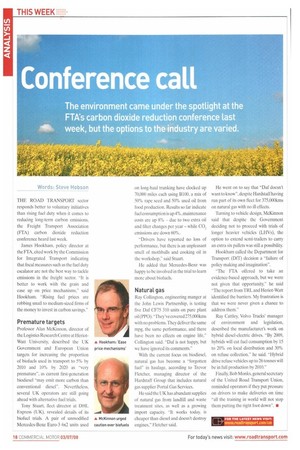The environment came under the spotlight at the FTA's carbon
Page 18

If you've noticed an error in this article please click here to report it so we can fix it.
dioxide reduction conference Last week, but the options to the industry are varied.
Words: Steve Hobson
THE ROAD TRANSPORT sector responds better to voluntary initiatives than rising fuel duty when it comes to reducing long-term carbon emissions, the Freight Transport Association (ETA) carbon dioxide reduction conference heard last week.
James Hookham, policy director at the ETA, cited work by the Commission for Integrated Transport indicating that fiscal measures such as the fuel duty escalator are not the best way to tackle emissions in the freight sector. "It is better to work with the grain and ease up on price mechanisms," said Hookham. "Rising fuel prices are robbing small to medium-sized firms of the money to invest in carbon savings."
Premature targets
Professor Alan McKinnon, director of the Logistics Research Centre at HeriotWatt University, described the UK Government and European Union targets for increasing the proportion of biofuels used in transport to 5% by 2010 and 10% by 2020 as "very premature", as current first-generation biodiesel "may emit more carbon than conventional diesel". Nevertheless, several UK operators are still going ahead with alternative fuel trials.
Tony Stuart, fleet director at DHL Express (UK), revealed details of its biofuel trials. A pair of unmodified Mercedes-Benz Euro-3 6x2 units used on long-haul trunking have clocked up 70,000 miles each using B100, a mix of 50% rape seed and 50% used oil from food production. Results so far indicate fuel consumption is up 4%, maintenance costs are up 8% due to two extra oil and filter changes per year while CO, emissions are down 60%.
"Drivers have reported no loss of performance, but there is an unpleasant smell of mothballs and cooking oil in the workshop,said Stuart.
He added that Mercedes-Benz was happy to be involved in the trial to learn more about biofuels.
Natural gas
Ray Collington, engineering manger at the John Lewis Partnership, is testing five Daf CF75 310 units on pure plant oil (FPO). "They've covered 275,0001ons with no problems. They deliver the same mpg, the same performance, and there have been no effects on engine life," Collington said. "Daf is not happy, but we have ignored its comments."
With the current focus on biodiesel, natural gas has become a "forgotten fuel' in haulage, according to Trevor Fletcher, managing director of the Hardstaff Group that includes natural gas supplier Portal Gas Services, He said the UK has abundant supplies of natural gas from landfill and waste treatment sites, as well as a growing import capacity. "It works today, is cheaper than diesel and doesn't destroy engines," Fletcher said. He went on to say that "Daf doesn't want to know", despite Hardstaff having run part of its own fleet for 375,000kms on natural gas with no ill effects.
Turning to vehicle design, McKinnon said that despite the Government deciding not to proceed with trials of longer heavier vehicles (LHVs), the option to extend semi-trailers to carry an extra six pallets was still a possibility.
Hookham called the Department for Transport (DfT) decision a "failure of policy making and imagination".
"The ETA offered to take an evidence-based approach, but we were not given that opportunity," he said "The report from TRL and Heriot-Watt identified the barriers. My frustration is that we were never given a chance to address them."
Ray Cattley, Volvo Trucks' manager of environment and legislation, described the manufacturer's work on hybrid diesel-electric drives. -By 2009, hybrids will cut fuel consumption by 15 to 20% on local distribution and 30% on refuse collection," he said. "Hybrid drive refuse vehicles up to 26 tonnes will be in full production by 2010."
Finally, Bob Monks, general secretary of the United Road Transport Union, reminded operators if they put pressure on drivers to make deliveries on time "all the training in world will not stop them putting the right foot down". •
FOR THE LATEST HEWS VISIT: CD` www,idtraaspeet.comIci
































































































































































